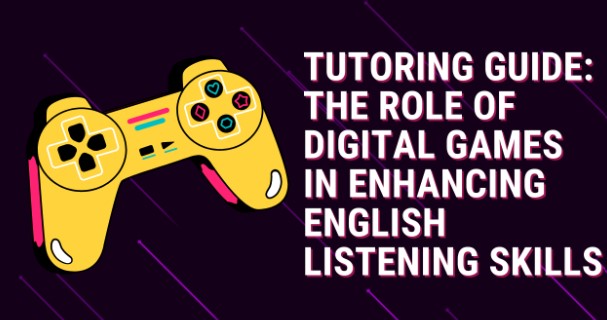Education is undergoing a significant transformation in today’s world. In every learning institution, tutors must proactively participate in developing new teaching and learning methodologies. In this context, one of the approaches that is gradually drawing attention is the method of using digital games to improve listening skills in English. Now let us look at how these interactive tools may be beneficial to you as a tutor and your students in terms of their language development.
- Integrating Digital Games into English Tutoring
- Impact of Digital Games on English Listening Skills
- Selecting the Right Digital Games for Tutoring
- Implementing Digital Games in Tutoring Sessions
- Challenges and Solutions in Using Digital Games
- Future Trends in Digital Game-Based Learning
- Comparison: Traditional Methods vs. Digital Game-Based Learning
- Conclusion: Embracing the Future of Language Learning
- FAQs
Integrating Digital Games into English Tutoring
The Need for Modern Tutoring Methods
It is worth noting that people no longer have to depend on heavy dictionaries and cassettes to learn languages. The current generation of school learners has grown up with technology in classroom settings. This shift has made it not only possible but essential to modernize the methods of tutoring.
Digital Games as Educational Powerhouses
Video games are not only fun but also valuable learning tools. They create environments in which the student is placed in a realistic context with which to use the language as required, hence promoting natural learning.
Video games are efficient teaching tools; research shows that digital games improve listening, speaking, and overall language skills.
Digital games have emerged as powerful tools for enhancing English listening skills, offering an engaging and interactive approach to language learning. These games provide immersive environments where learners can practice their listening comprehension in context, often featuring native speakers and diverse accents.
Many English tutors online are incorporating digital games into their lessons, recognizing their potential to boost motivation and create a low-stress learning atmosphere. From story-driven adventures to multiplayer quizzes, these games expose learners to authentic language use, idiomatic expressions, and cultural nuances, all while providing immediate feedback and opportunities for repetition.
By combining entertainment with education, digital games are transforming the way students develop their English listening abilities, making the learning process more enjoyable and effective.
Success Stories in Game-Based Tutoring
Studies have found that students using digital games for tutoring perform better than those in traditional classes. This success gives a vivid idea of why these tools ought to be utilized in your tutoring practice.
Impact of Digital Games on English Listening Skills
Cognitive Benefits: More Than Just Fun and Games
Instead of just being a source of fun, digital games engage brain activity necessary for language acquisition. Research indicates that game-based learning can enhance listening skills among ESL learners by Research indicates that game-based learning can enhance listening skills among ESL learners by:
-
Fostering engagement
-
Reducing anxiety
-
Improving auditory processing
Proven Improvements in Comprehension
Whenever experimental groups employ the use of games as a form of enhancing learning, the outcome is always better results in listening tests compared to the control groups who are subjected to normal formal learning. As we can see from this data it is possible to conclude that using digital games can help develop comprehension skills.
Games That Make a Difference
Certain types of games are especially effective for targeting listening skills:
-
Interactive storytelling games
-
Games where the player has to solve a puzzle with some audio included
-
Role-playing games with dialogue
Effectively, these games have been discovered to boost students’ comprehension and sound conscientiousness.
Selecting the Right Digital Games for Tutoring
As will be seen, the selection of games is critical to the achievement of learning objectives. Here’s what to consider:
Curriculum Alignment is Key
Effective educational games are closely aligned with educational goals and objectives. According to the survey among the students, 70% opine that games may help them learn communicative English skills.
Age-Appropriate Selection
Different age groups benefit from different types of games:
-
Younger learners: Games focusing on basic listening skills
-
Older students: Games with more complex auditory tasks
Engagement: The Secret Ingredient
Choose the games that will require the individuals to actively participate. These elements are essential in ensuring that the students can persevere and continue learning.
Implementing Digital Games in Tutoring Sessions
Strategies for Seamless Integration
-
Balance is crucial: Combine game time with traditional methods
-
Set clear objectives: Align game activities with learning goals
-
Provide context: Explain how the game relates to language skills
Monitoring Progress
Regular evaluations are vital. Tutors should note:
-
Increased engagement during gameplay
-
Improved accuracy in responses
-
Better overall comprehension in non-game activities
Best Practices for Implementation
Incorporating digital games into tutoring sessions is more effective when followed by reflective discussions. These discussions aid in reinforcement and assessment of learning that also sheds light on students’ listening skills growth. Further, to get students more interested in doing exercises, these usual exercises can be followed by some interesting games. Since clients’ proficiency rises, periodic enhancement of the difficulty of the games helps maintain interest and development of students’ auditory comprehension.
Challenges and Solutions in Using Digital Games
Common Obstacles
-
Technical issues: Ensure all equipment is working before sessions
-
Over-Reliance on games: Maintain a balance with traditional methods
-
Choosing inappropriate games: Research and test games beforehand
Overcoming Challenges
-
Solution 1: Have backup activities ready in case of technical problems
-
Solution 2: Set strict time limits for gameplay within sessions
-
Solution 3: Create a curated list of games suited for different levels and skills
Real-Life Solutions
Case Study: A tutor faced resistance from parents who viewed games as non-educational. The solution? Organizing a demonstration session showing the educational value of carefully selected games, changed the parents’ perspective.
Future Trends in Digital Game-Based Learning
Emerging Technologies
-
Virtual Reality (VR): Immersive language environments
-
Artificial Intelligence (AI): Personalized learning experiences
-
Augmented Reality (AR): Real-world language application
Predictions for Game-Based Learning
-
Increased integration of VR in language immersion programs
-
AI-driven games adapt in real-time to learner’s progress
-
More collaborative, multiplayer games for peer-to-peer learning
Staying Ahead as a Tutor
-
Attend educational technology conferences
-
Regularly visit internet forums that are destined for language tutors
-
Try out new games or new technologies in your sessions
Comparison: Traditional Methods vs. Digital Game-Based Learning
|
Aspect |
Traditional Methods |
Digital Game-Based Learning |
|
Engagement |
Can be passive |
Highly interactive |
|
Personalization |
Limited |
Adaptive to individual needs |
|
Immediate Feedback |
Delayed |
Instant |
|
Repetition |
Can be tedious |
Enjoyable through gameplay |
|
Real-world Application |
Often theoretical |
Simulated real-life scenarios |
|
Progress Tracking |
Manual |
Automated and detailed |
|
Motivation |
External (grades) |
Intrinsic (enjoyment) |
Conclusion: Embracing the Future of Language Learning
It is not just a fad; the use of video games in English instruction, particularly for teaching listening comprehension, is a revolution in language learning. Digital games are an important instrument for coaches who want to modernize their instructional tactics and provide more efficient learning experiences to their learners. These have been seen to improve involvement, comprehension, and general language proficiency levels.
The key is to select the right games, manage them effectively, and balance them with traditional teaching methods. Teachers can achieve great improvements in their students’ learning outcomes. They must get ready for this digital age by embracing cutting-edge technologies at present and staying current on future trends.
FAQs
-
Are digital games effective for all age groups in enhancing listening skills?
The effectiveness of a game depends on how well it fits the target age range. While games for senior students handle increasingly difficult auditory comprehension problems, those made for younger learners concentrate on fundamental listening skills.
-
How do I measure the improvement in listening skills when using digital games?
Assessing students’ progress can be done through regular evaluation methods such as testing their listening skills and giving them comprehension quizzes. Additionally, getting to know if the kids are changing in their involvement and accuracy of responses when they play games provides a useful insight into their improvement.
-
Can digital games replace traditional listening exercises in tutoring?
No, digital games are also to be used along with traditional methods. A well-rounded strategy implies that the complete development of listening skills depends on a combination of traditional exercises and games.
-
What if my students become too focused on winning the game rather than learning?
Selecting games in which getting to know is critical to development is vital. Talk approximately the language abilities being practiced and how they follow the goals of the game regularly. This preserves the exciting detail whilst preserving the mastering front and middle.
-
How can I convince skeptical parents about the educational value of digital games?
Discuss the results of studies on the advantages of game-based learning. Provide a demonstration session to illustrate the pedagogical application of games. Give parents frequent updates on their child’s development to demonstrate the efficacy of this method.



